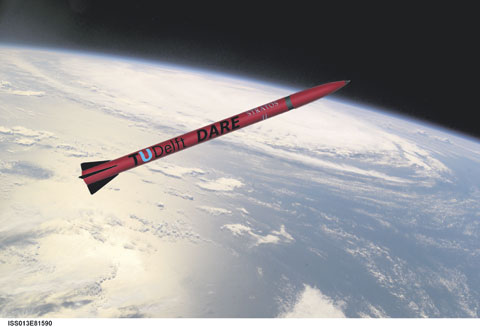This week TU Delft’s rocketeers are celebrating the two-year anniversary of the launch of their record-breaking rocket with a presentation of their latest project: a student-built rocket that’ll go halfway to space.
Dare (Delft Aerospace Rocket Engineering) is the TU Delft Dream Team for building and launching rockets.
On March 17, 2009, the Dare-built Stratos I rocket reached an altitude of 12.3 km above the launch pad, breaking the European altitude record for amateur rocketry. Two years down the road and that record still holds, although Dare has now set itself a new goal: to get halfway to space. The Stratos II rocket – planned for launch in mid-2012 – will reach an altitude of 50km, thus becoming the stepping stone for Dare’s ultimate goal: to reach space with a student-built rocket.
Students will design and manufacture everything for the Stratos II: rocket-propulsion system, propellant, electronics… even the launch tower. And unique among TU Delft Dream Teams, the Stratos II project’s goal is something that’s never been achieved by any other university team in the world. This rocketry team will build on previous experience gained in the Stratos I project, but to reach 50 kilometers a new-generation of electronics and rocket propulsion systems must be designed and built.
To ensure the rocket has a high-performance propulsion system, there are currently two internal Dare teams competing for production rights: solid or hybrid propulsion. The solid propulsion system team is developing a new Ammonium Nitrate-Aluminum-based solid propellant and lightweight composite and heat-resistant polymer rocket motor casing. The hybrid team meanwhile uses a solid fuel and a fluid oxidizer with an innovative engine design that’s a first in its class of Dare hybrid engines.
The Stratos II rocket is expected to carry scientific experiments in 12 payload slots in its nosecone. Owing to certain launch regulations, however, the rocket will be launched from a rocket range located outside of the Netherlands.
The ultimate question for the team is whether the recovery system of the rocket will work, safely returning the payload to the ground. The Stratos I rocket’s recovery system failed due to an error in the parachute deployment sequence, causing the rocket to hit the ground at a speed of 250 m/s. To prevent this from happening to the Stratos II payload, Dare’s challenge is to re-design the flight computer.
Dare eventually plans to build a student-made space-bound rocket. But before that can happen the Stratos II upperstage must to graze the 50km altitude line, a goal that can only be achieved through teamwork and the perseverance of students dedicated to reaching space.
To find out more about the project, come to the ‘Student to Space’ presentation, given by Stratos II teamleader Frank Engelen, on Thursday the 17 March at 20:00 in lecture room A of the EEMCS faculty, or visit projectstratos.nl
Eenmaal gestolen, kunnen de geregistreerde fietsen makkelijker worden opgespoord, zo is het idee.
Gedurende de actie vertelde de politie in de aula, tijdens het symposium Aanpak Fietsdiefstal, over haar laatste technieken om dieven in de kraag te vatten.
Studenten met oude barrels konden overigens maar beter uit de buurt blijven, “want”, zo zei een van de medewerkers van Centrum Fietsdiefstal, “als je niet al een oud registratienummer in je frame hebt staan, als dat bijvoorbeeld is weggevijld, dan wordt je fiets in beslag genomen.”



Comments are closed.